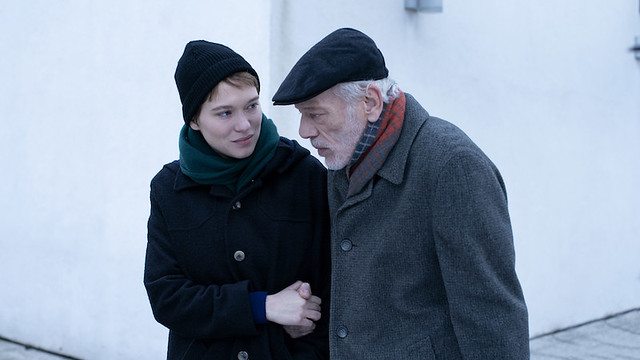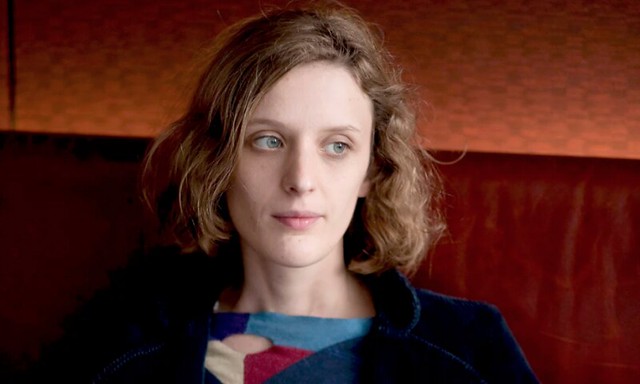 After experimenting with the self-reflexive Bergman Island where she explored the origins of the artistic inspirations and the nature of art influencing life and vice versa, esteemed writer/director Mia Hansen-Løve comes back to her usual theme of grief and passage of time with quietly devastating yet lovely, One Fine Morning. The theme, I truly believe, that no other contemporary film directors can put in words and on screen, as acutely and sensitively as she can. With exceptional script and acting, One Fine Morning is a finely composed filmmaking at its best.
After experimenting with the self-reflexive Bergman Island where she explored the origins of the artistic inspirations and the nature of art influencing life and vice versa, esteemed writer/director Mia Hansen-Løve comes back to her usual theme of grief and passage of time with quietly devastating yet lovely, One Fine Morning. The theme, I truly believe, that no other contemporary film directors can put in words and on screen, as acutely and sensitively as she can. With exceptional script and acting, One Fine Morning is a finely composed filmmaking at its best.
Léa Seydoux plays Sandra, a Parisian widow juggling life with tending to her grade school daughter, taking care of her aging father while working as a translator. She leads a relatively quiet existence with her loving daughter Sarah in her tiny apartment. She is a learned woman who speaks several languages and is very efficient at her job. But it's her father, Georg (Pascal Greggory) who's in sharp cognitive decline, and in great need of help with everything from opening the front door of his flat, to going to the bathroom. He often forgets where he is and where he places things. With her siblings busy with their own lives, it seems the duty to look after him largely falls on Sandra. As she and her mom/Georg's ex (Nicole Garcia), discuss the next steps, she realizes that Georg is facing grim prospects- Retirement home in Paris is expensive, has a long waitlist, and his pension alone will not cover it. And they've heard so many horror stories about the condition of many of these establishments. They are pretty much a waiting place for undignified death. He will also need to sell his flat, which is filled to the brim with books, as he was a scholar and a teacher. 'What do we do with all of his books?' Sandra wonders out loud. 'These were his life.' Françoise, maybe cold but more practical, tells her that they will have to throw away most of them. 'Why don't you just burn them?' She quips. Hansen-Løve doesn't shy away from all the life's complications. These are real quandaries people actually face in life. So is love and relationship.
Sandra finds love in an unexpected place. She runs into Clément (Melvil Poupaud), an acquaintance of her dead husband, at a playground while playing with her daughter. He is married and has a young son. He is an astro-chemist and takes long expedition trips to the remotest areas. There is a mutual attraction and they can't help but fall for each other. But he is not ready to leave his family for her. This is again, another added complication Sandra wasn't really looking for in life. Even though she still pretty young, she had given up on any romance long ago, resigned to the idea that part of her life is already over. But life throws curve balls at you like that.
It is almost unthinkable to see Seydoux, a glamorous international movie starlet as a sad, frumpy, middle aged single mom. But with short haircut and no makeup in her mom jeans, she is remarkably natural as Sandra, who thinks she is over her prime, weathering life's problems. In her understated way, Seydoux conveys Sandra's enormous compassion toward her father and deep understanding of his predicament - a brilliant academic whose age rapidly robbing away at what he once was and awkward shyness of finding herself to love and be loved again which she already had given up on. It is by far the best performance of her career if not the most poignant. Greggory, once a dashing leading man in French cinema not twenty years ago, plays demanding role of a brilliant mind in cognitive decline. Garcia gives matter of fact, no nonsense woman who provides much needed dry humor as she banters with her new husband about the state of French politics, portraying the embodiment of a Macron liberal. Poupaud is also on point with nerdy energy and charm, equally surprised by his own forwardness with the declaration of love.
As with all of her previous films, Hansen-Løve is a keen observer of fleeting life. This time she is tackling the theme of aging and decline, which is not a subject many filmmakers touch upon. This is part of life many people don't want to think about but fast becoming an issue as the elderly population grows larger. It makes you think about the attitudes towards elderly. Once brilliant, vibrant minds who need our compassion and treated with dignity, not pity and sympathy. Because we will all become old one day. One Fine Morning, as the simple title suggests, all we can do is face the life one day at a time. Leave all the sorrows of yesterdays behind because there will be another beautiful morning tomorrow.
One Fine Morning opens 1/27 in New York and Los Angeles. National release will follow.
